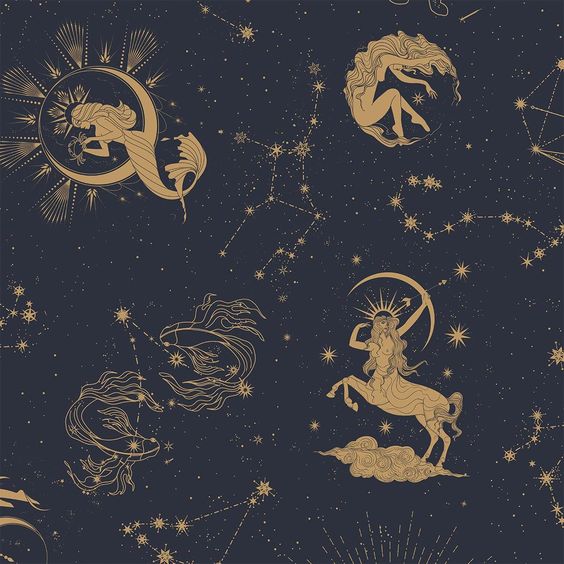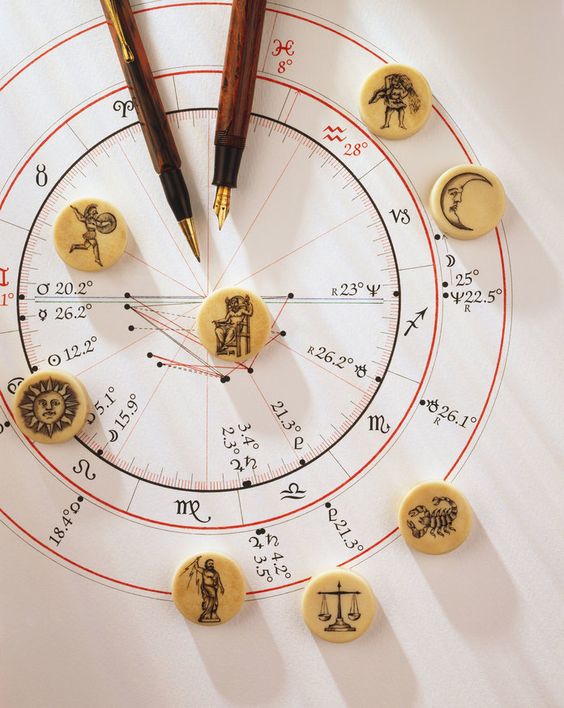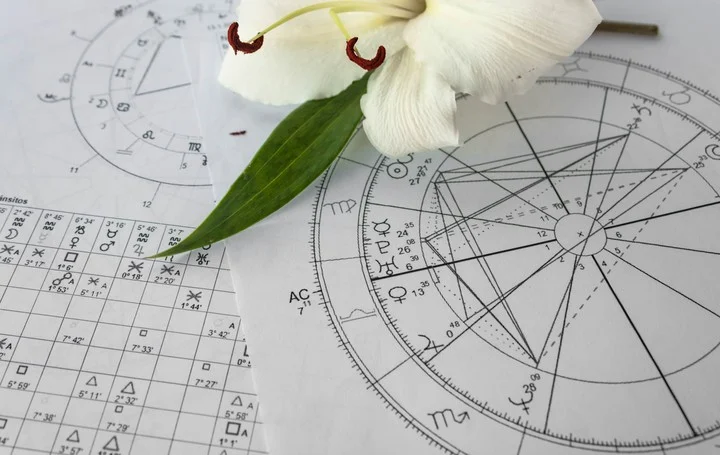 The trine aspect. Picture two planetary archetypes who just get each other. No drama—just divine synchronicity, as if the universe itself were saying, “This is how it’s meant to flow.” In astrological terms, a trine is a 120° of angular distance, usually in the same element—fire, earth, air, or water. Now, the sextile—it’s more like potential in waiting. It demands some engagement, some participation. It’s lucky, but only if you work it. The trine, on the other hand, is luck you didn’t even know you had until you find yourself serendipitously thriving. But what is easy can sometimes be taken for granted. A trine can be so smooth, so natural, that its gifts go unnoticed or underutilized. Comfort, if unchallenged, can breed complacency. So if your chart is sprinkled with trines, celebrate—but also consciously cultivate those gifts.
The trine aspect. Picture two planetary archetypes who just get each other. No drama—just divine synchronicity, as if the universe itself were saying, “This is how it’s meant to flow.” In astrological terms, a trine is a 120° of angular distance, usually in the same element—fire, earth, air, or water. Now, the sextile—it’s more like potential in waiting. It demands some engagement, some participation. It’s lucky, but only if you work it. The trine, on the other hand, is luck you didn’t even know you had until you find yourself serendipitously thriving. But what is easy can sometimes be taken for granted. A trine can be so smooth, so natural, that its gifts go unnoticed or underutilized. Comfort, if unchallenged, can breed complacency. So if your chart is sprinkled with trines, celebrate—but also consciously cultivate those gifts.
The trine aspect in astrology is where things are going to be just a little bit easier, a little more charmed. These planets are speaking the same language, albeit with different dialects, and they seem to understand each other without the need for translation. The trine represents a kind of internal harmony, a place where talents seem to spring forth naturally. People with strong trines in their birth charts often find they have innate abilities, perhaps a flair for music, an effortless charm, a gift for making things look easy. But the very effortlessness of the trine can sometimes lull one into passivity. Because things come so naturally, there’s often no sharp push to develop them further. Compared to other aspects—like the square, which feels like a tug-of-war in the psyche, or the sextile, which encourages growth through conscious effort—the trine feels like déjà vu, like a memory of something you never formally learned but somehow always knew. It’s a soul skill. A knowing without instruction. The trine is a gift—but like all gifts, its value depends on what you do with it. It offers a chance to create, to express, to shine in a way that feels almost too simple to be true. But don’t be fooled by its ease; it’s still part of your soul’s journey.
The trine is a symbol of natural compatibility, an affirmation that certain parts of your psyche, certain tendencies and talents, are in sweet accord. When planets are trined in the natal chart, they share a mutual understanding that doesn’t need to be fought for or explained. Their energies don’t just coexist—they conspire effortlessly. This is why the trine often carries the scent of the word “gifted”—a term that floats around the chart with flattering ease.
It hints at talents that come forth as if from some mysterious spring, unbidden and unburdened. A person with multiple trines may find that things come easily, sometimes too easily. Their charm may open doors before they’ve knocked, their intellect may shine without revision, and their creativity might bloom without ever being planted. But just as a life of eternal summer might seem idyllic but would eventually lead to drought, a chart flooded with trines can risk becoming too comfortable, too smooth. There is a seduction in ease, a kind of trap. Some astrologers caution against seeing trines as a free pass to happiness or success. They suggest that while trines may pave the road, it’s the more challenging aspects—the squares and oppositions—that provide the tension, the grit, the real story. Trines might make you gifted, but it’s the friction that makes you grow.
A person with an overabundance of trines might drift, buoyed by natural abilities but lacking the struggle that form depth. They might become so accustomed to ease that when true difficulty arises, they’re ill-equipped to respond. It’s like living in a house where all the doors open for you—until one day, one doesn’t, and you’ve never learned how to turn a knob. So while trines are undeniably lovely, they are best appreciated in balance. Their value is immense, but only when the individual recognizes them for what they are: opportunities, not guarantees. To truly honor the gift of a trine is to meet it halfway—to cultivate what comes naturally, to deepen what arises effortlessly, and to avoid the temptation of resting forever in the comfort of “easy.”
Trines say, “Here, life may be kind to you.” But astrology doesn’t hand out gifts without context. This is why astrologers of substance always advocate for a holistic view. You mustn’t fall so in love with your trines that you neglect your squares—the challenging aspects that, while often uncomfortable, are the true teachers. They demand something of you. They ask you to reckon with your contradictions, to climb the psychological stairs when the lift is broken. And from this effort, from the confrontation with difficulty, comes true growth. To treat a birth chart as a collection of “good” and “bad” aspects is to miss the point entirely. Revel in your trines, but don’t let them lull you into a spiritual nap. Let the whole chart speak.
Sue Tompkins completely dismisses trines as lacking “oomph.” She’s not blind to the beauty of trines, but she’s wary of their tendency to flatter the ego while asking little of the soul. In a chart with squares and oppositions, there’s a demand, a call to action. Hence, her perspective insists on the value of struggle for what it catalyzes. Where the trine says “you’re good at this,” the square says “prove it.”
The key idea here is that the trine, while symbolizing talent, flow, and good fortune, doesn’t demand anything. It makes things available—but it doesn’t knock you over the head and drag you kicking and screaming into your own becoming. The individual, seduced by their own natural abilities, might fail to challenge themselves—to push beyond the path of least resistance into the terrain where transformation lives. She isn’t trying to dampen anyone’s joy in their trines, but rather to move us away from the temptation of spiritual laziness—the idea that astrology should be a mirror reflecting only our best angles. So let the trines be sweet, but don’t let them be smug. Let the squares be rough, but don’t let them be resented. The chart is a map, but you are the traveler. And the richest journeys are not always the easiest ones.












